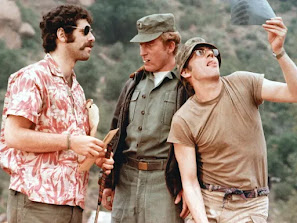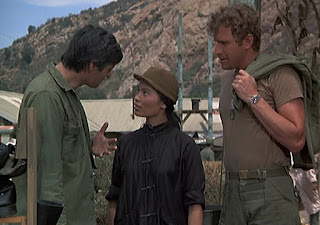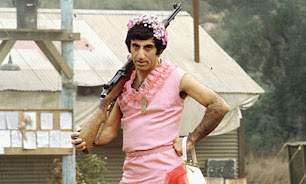“There are certain rules about a war. Rule number one is that young men die. And rule number two is, doctors can’t change rule number one.”
-Lt. Col. Henry Blake, “Sometimes You Hear the Bullet”
It all started with a doctor.
Heister Richard Hornberger, later known by his pen name Richard Hooker, was drafted shortly after graduating medical school into the Korean War –assigned as a surgeon to a new kind of unit: a Mobile Army Surgical Hospital or MASH for short. It was a field hospital stationed close to the front lines where quick surgeries and medical procedures could be performed on the recently wounded. During times of intense fighting, the doctors would often be bogged down in casualties. During lulls, there wasn’t much to do but for the personnel to find ways to entertain themselves in relative safety from enemy attack. This could lead to some pretty bizarre activities: a chaotic lightness to drown out the sombre work.
In 1968 Hooker published a novel, based heavily on his experiences of the war, called MASH: A Novel About Three Army Doctors. Set at the fictional 4077th MASH under the command of Lt. Col. Henry Blake, it followed the largely comical experiences of three anarchic doctors, Benjamin Franklin “Hawkeye” Pierce, “Trapper John” McIntyre, and Augustus Bedford “Duke” Forrest. The episodic book would see them follow up surgery by drinking martinis from their homemade still in their quarters, nicknamed “The Swamp”, clash professionally and personally with the inexperienced but higher-ranking surgeon Frank Burns, harass head nurse Margaret “Hot Lips” Houlihan, and get into various troubles before ultimately being discharged and sent stateside.
The book was successful enough that a movie adaptation came just two years later. Directed by Robert Altman and starring Donald Sutherland, Elliott Gould, Sally Kellerman, and Robert Duvall, 1970’s M*A*S*H was something of a watershed film of the New Hollywood era, an anti-authoritarian screed that used the Korean War as a stand-in to criticize and satirize the ongoing war in Vietnam. It’s the movie that really kickstarted Altmans’ career and cemented Sutherland and Gould as major stars of that decade. And it doesn’t really hold up so well. For how impressive Altman’s directing and the performances are, the movies’ unrelenting, abject cynicism gives it a real mean-spirited bent, none of the characters are invested with much life, and there’s a lot of casual misogyny built into the script, culminating in an act of humiliating sexual harassment being framed as a natural catharsis to be played for laughs. But the movie was a massive hit, to the point Hooker, who came to resent how little he sold the rights for, wrote two sequel novels in its’ wake, neither of which caught on.
Hooker conceived of MASH, Altman made M*A*S*H a sensation, but it is the version that succeeded both of them that ultimately transformed M*A*S*H, making it one of the critical media texts on war of the twentieth century. An effort to adapt the first of Hooker’s sequel novels fell through and Paramount instead decided to turn the movie into a TV series –its’ setting and characters after all lent themselves very well to the sitcom format. Developed by Larry Gelbart for CBS, this new version of M*A*S*H would replicate both the irreverent sensibility of the movie and the veiled criticism of Vietnam, but balance them both out with more defined characters and more direct conversations with the experiences of war. The superfluous character Duke Forrest was dropped and several others rewritten to better suit the shows’ new dynamic. Hawkeye, not Trapper, became Chief Surgeon, Franks Burns loses his hyper-religious qualities, and Henry Blake is made more of a competent though down-to-earth commanding officer. The new cast consisted of Alan Alda as Hawkeye, Wayne Rogers as Trapper, McLean Stevenson as Blake, Loretta Swit as Margaret Houlihan, Larry Linville as Frank, and Gary Burghoff, the sole cast member from the movie, reprising his role as naïve young company clerk Walter “Radar” O’Reilly. The pilot episode, opening with the text “Korea, 1950: a hundred years ago”, aired on September 17th, 1972 –fifty years ago.
M*A*S*H, which ultimately ran for eleven seasons on CBS, was a cultural staple of its’ time but a show that lately doesn’t seem to get the attention it deserves. It is still generally considered one of the more important series in American television history (and weirdly based on what can be found on youtube, seems to have been very popular in Australia even up to just a few years ago), but the series in more recent years feels under-discussed. This is the show that still holds the record for the most-watched narrative television event in U.S. history for the series finale “Goodbye, Farewell, and Amen”, but there’s been next to no tributes or acknowledgements of its’ milestone anniversary this year. And that’s quite sad given the breadth of its’ influence and cultural import –a show that was consistently entertaining, thoughtful, and frequently ahead of its’ time for a network comedy.
That descriptor stings of some inaccuracy though, as while M*A*S*H often (and especially early on) had a breezy and comic tone to the everyday lives and attitudes of its’ characters, it was also unafraid to explore the heavy stuff that is a necessity when dealing with the subject of war. As such it became one of the first major shows that can be rightly called a ‘dramedy’, or comedy-drama –whilst evenly maintaining its’ sitcom elements. Some point to this as having been a gradual shift, and while the dramatic material did increase over time, it was however always there -from as early as “Yankee Doodle Doctor” near the top of season one. The show knew how to balance these tones like no other and could get away with fully comic and fully dramatic plots alike in its’ later seasons.
Unlike the original text and author, the series was firmly anti-military and left-leaning, frequently criticizing the military industrial complex, the power abuses or else amoral bureaucracy of its’ leaders, the racism encouraged by that system in Korea, and the Red Scare. All of this was pretty bold during a time when Vietnam was still ongoing or in recent memory during the series’ run –which famously lasted almost four times as long as the actual Korean War. And there are plenty of anachronisms because of this, even more continuity errors. In season one, Hawkeye in a letter to his dad makes reference to the recent election of Dwight Eisenhower, placing the episode in late 1952 less than a year out from the wars’ end. Truman was sometimes referenced as President later on in the series. In season six, a character brags of an acquaintance with Audrey Hepburn –which should have been impressive to nobody given her breakout in Roman Holiday wouldn’t come until a month after the Korean War ended. And season nine features an episode that plays through an entire year at the 4077th from 1950 to 1951, with the same cast in place. This floating timeline perhaps accounts for why Trapper, Colonel Blake, and Frank Burns are referenced so rarely after they left the series.
And yes, M*A*S*H was a show that went through significant cast changes over its’ run. The series lost one third of its’ main cast at the end of season three when both Stevenson asked to be let out of his contract and Rogers decided against returning during the hiatus. For season four, they were each replaced, with Mike Farrell coming in as wholesome family man surgeon B.J. Hunnicutt and Harry Morgan taking up the mantle of company C.O. as veteran army officer Sherman Potter. Subsequently, Linville left the show at the end of season five to be succeeded by David Ogden Stiers as posh Bostonian Charles Emerson Winchester III. Lastly, Burghoff left early into season eight, the role of company clerk being passed on to Jamie Farr’s eccentric Maxwell Klinger, who had been with the series on a recurring basis from the first season as a corpsman, becoming a series regular starting with season four. That was also the case for company chaplain Father Francis Mulcahy, played by William Christopher –himself promoted to the main cast in season five. Only Hawkeye and Margaret were there from beginning to end with just the former appearing in every episode.
Eleven years is a long time. But during its’ run, M*A*S*H maintained its’ core values, though they went through some development and growth. It’s all the same show and yet it can be grouped into three distinct eras (arguably four) that stand apart in some respects and speak to the shows’ sense of self and the world at those times. And that is how I am going to relate, discuss, and pay tribute in installments over the coming weeks.
But first some things need to be addressed. M*A*S*H is a show that ruffled feathers in good ways, that stood as an example, and that was ahead of the curb –but not in all things. So let’s get out of the way the stuff that has aged poorly and engage with it before proceeding onto the show proper. First off it’s fair to say that the show in its’ early goings inherited more than a degree of the movies’ sexism. This is especially seen in the character of Margaret, who is presented as a stiff, self-serious, sexually repressed hypocrite, who with her romantic partner Frank exists to be a metaphorical punching bag for the fun characters. She’s invested with little more character than the Dean of Animal House, and her regular routine with Frank, whereby she constantly flatters the doofus surgeon and his army patriotism while denying the open secret affair between the two gets old rather fast. Occasionally she does get to be funny or express some other dimension to her character, but I’d wonder why Loretta Swit stayed on in that same status quo for the better part of four seasons (it’s a blessing she did though for reasons we’ll get into). Eventually she was treated with more humanity and intelligence, finally breaking it off with Frank in season five, and though she retained her stubbornness and fierce professionalism, became a much more respected character -the nickname “Hot Lips” was rarely used post-season three.
However then there are issues with the frequent womanizing of Hawkeye and Trapper and even Colonel Blake, the latter two of whom had wives and families back in the States. Sexual infidelity is just a matter of course in these circumstances and sometimes the behaviours of the male characters towards the women at camp could be uncomfortable. And then there’s just the matter of how small a role women in general play on the show. Despite the 4077th being staffed with regular nurses, none felt like like mainstays and there were only a couple recurring characters (Nurse Kellye, played by Kellye Nakahara, is one of the exceptions and at some point ought to have been a series regular). The show did gradually get more feminist, especially at Swit’s insistence and once Alda took more control, but the general sexual politics weren’t always the most enlightened.
There’s also the race issues that you might anticipate for a show made in the 70s set in Korea. Once again particularly the early seasons featured occasional Korean characters who played into stereotypes, be they in language, demeanour, or just general tropes. The Swamp’s domestic servant Ho-jun from the first season is a good example. This too did get better over time, the show was good about adjusting its’ sensitivities, and to it’s credit had plenty of anti-racist storylines around the relationships between the doctors and the North Koreans or communist Chinese. But you could argue that even with the best of intentions and late into the series, the Asian characters who appeared weren’t given a lot of dimension, and that their characterizations and conflicts were almost always purely in service of the white protagonists. That’s a fair criticism. It’s also fair to point out that a lot of these Korean characters were played by non-Korean Japanese or Chinese-American actors. The show provided steady work for Asians in Hollywood -Sab Shimono and Mako played multiple characters over its’ run. But the Asian voice is not really represented there, except for a handful of standalone episodes. It is a thoroughly American series.
And lastly, let’s get to the elephant in the room. The problematic aspect of M*A*S*H that unavoidably comes up when discussing the show in a modern progressive, genderfluid age -we gotta talk about Klinger. Cpl. Max Klinger is an orderly at the 4077th whose defining characteristic for the better part of seven seasons is his desperation to get out of the war via a Section 8 discharge -a discharge on the grounds of insanity. And his preferred method of illustrating this is to dress in womens’ clothing, usually to the shock and consternation of visiting military brass and the bemusement of everyone at the camp. The joke is simply the idea of a man, and a particularly hairy Lebanese man, hanging around a military camp in ever more elaborate or revealing womens’ dresses, because gender nonconformity is funny. This was surely the intent, aided by Klinger’s occasional stereotypically feminine attitude towards his fashion.
However I would posit a degree of nuance to this aspect of Klinger and the show, which I find is incredibly fascinating. Firstly, that it never works but might if Klinger committed more to the bit than his comfort zone allows. Everybody at the 4077th is completely nonplussed by him, and treat his behaviour with casual good humour -to the point they’ll even compliment his tastes. For his part, he never goes so far as to act like he legitimately identifies as a woman or even as a gay man, never puts on any airs to those conclusions that in a highly homophobic, transphobic military atmosphere of the 1950s would surely get him kicked out. Originally in fact, he was written to be a gay stereotype, but the writers ultimately decided it was funnier if he was simply a straight guy in a dress. Secondly, the show did on occasion explore Klinger’s drag with complexity. One episode has him confess to recurring psychologist Sidney Freedman (Allan Arbus) that he actually genuinely likes wearing womens’ clothes and is told there is nothing psychologically wrong with that. Indeed, even after he sheds the gimmick as company clerk he is sometimes still seen wearing earrings.
These moments and the fact that he doesn’t lose the respect and dignity of his colleagues (except for the explicitly bigoted Frank and Margaret) makes shades of this characterization subtly, perhaps inadvertently enlightened. There’s some small critique there on gender roles and presentation in society, both in the 50s and the 70s -Farr eventually asked that the bit be laid to rest not out of offence or embarrassment, but because his kids were being bullied at school because of it. It’s hard to say, but there’s definitely a lot more to Klinger’s drag than the surface would suggest. All that said, I get the hang-ups one would have. Klinger’s presentation certainly allows for several moments of casual homophobia. However you interpret him, it’s clear he was designed as a way of making light of gender nonconformity in the army. Although I think what gets lost in the discussion around Klinger’s whole act is the fact he is the only person of colour on the show -and his Lebanese-American heritage quietly serves his identity just as much (at least once he is implied to be Muslim, a rare thing for American T.V. of that time).
And now with all that baggage cleared, it is time to look at the run of the show itself.
To be continued…
Support me on Patreon: https://www.patreon.com/JordanBosch
Follow me on Twitter: https://twitter.com/Jordan_D_Bosch
Letterboxd: https://letterboxd.com/jbosch/















Comments
Post a Comment